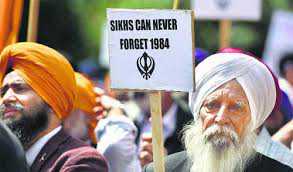
Tribune News Service
New Delhi, November 28
The Delhi High Court Wednesday upheld the conviction of 70 out of the 89 people who were awarded five-year jail term by a trial court for rioting, burning houses and violation of curfew during the 1984 anti-Sikh riots.
Of the remaining 19 people, 16 died during the pendency of their appeals against the trial court's August 27, 1996, decision.
The high court dismissed their appeals against the conviction by a trial court for burning houses and curfew violations during the riots.
Justice R K Gauba directed all the convicts to surrender within four weeks.
The convicts had challenged the August 27, 1996, judgement of a Sessions Court, which had convicted 88 out of the 107 people arrested on November 2, 1984 for rioting, burning houses and curfew violation in Trilokpuri area of East Delhi.
The court said the cases showed how law and order machinery had broken down, and suggested reforms in criminal law to deal with such matters.
The judge said the civil administration did not take timely or effective action to prevent the riotous conditions from spiralling out of hand, the criminal law process was slow and delayed and it all led to such matters continuing to linger in courts.
The high court said that this showed that "the response of the law has been tardy, ineffective and highly unsatisfactory".
"The case at hand, as observed elsewhere in this judgment, may be treated as a paradigm which ought not be followed in cases of such nature. The law and order machinery had broken down. The police forces, and the civil administration, did not take timely or effective action to prevent the riotous conditions from spiralling out of hand," it said.
"The criminal law process began, but hesitatingly and belatedly. The fact that these cases have continued to linger in the courts at the stage of trial or appeals or revisions till date itself is an indicator of the reality that the response of the law has been tardy, ineffective and highly unsatisfactory," the court said.
The court also said that general criminal law had proven itself “ill-equipped” to deal with the challenge of such crimes of mammoth proportion, “particularly when they invariably are perceived to be engineered by those holding control over certain power centres”.
It further said that no meaningful thought has been spared till date to usher in reforms in the judicial process to effectively deal with the cases of communal riots "which are engineered, more often than not, by those who have clout or influence- of various kind".
The court said it needs to be noted again that after each event of communal riots, allegations of political influences having worked as the root cause or for protection of those responsible have surfaced.
"There perhaps can be no two opinions about the fact that a sense of neutrality in the investigative and prosecution process has to be injected. And, towards this end, the possibility of entrusting such tasks to authorities other than normal agencies of the State needs to be explored," the court suggested.
The court suggested amending the Commissions of Inquiry Act, 1952, and the Protection of Human Rights Act, 1993 to entrust such bodies with the responsibility of taking note of cognisable offences committed in communal riots, investigate through special investigating teams (SITs) under their control and oversee prosecution through Special Public Prosecutor(s) engaged by them.
"The law on the subject of communal riots cannot be a complete answer to the challenge unless it also establishes special courts with suitable amendments to the general criminal law procedure as indeed the rules of evidence," the high court suggested.
It also said that since media—both print and electronic—was the fourth pillar of democracy, press reports supported by photographic material and video footage may be utilised as evidence in trials of criminal cases arising out of communal riots.
Unidentified bodies
The court asked the Delhi Police to find out if any cases were lodged in connection with 22 unidentified bodies of victims and said the evidence should be re-examined for further action as required under the law.
Justice Gauba gave the suggestion to the police in his judgement dismissing the 22-year-old appeals of persons convicted and awarded five-year jail term for rioting, looting and burning houses in Trilokpuri area here during the 1984 anti-Sikh riots.
The high court noted in its verdict that prosecutions in this case covered only 73 homicidal deaths, whereas a total of 95 bodies were "gathered during the night of November 2-3, 1984" as per the FIR.
"It is likely that 22 homicidal deaths may not have seen any criminal action initiated against anyone till date.
"In the foregoing facts and circumstances, this court directs the Commissioner of Police, Delhi to have the material, and the evidence, in above nature, re-examined by an appropriate agency for such further action under the criminal law as may be requisite," the high court said.
Some 95 bodies were recovered in Trilokpuri during the anti-Sikh riots—22 of them still unidentified. With PTI



























